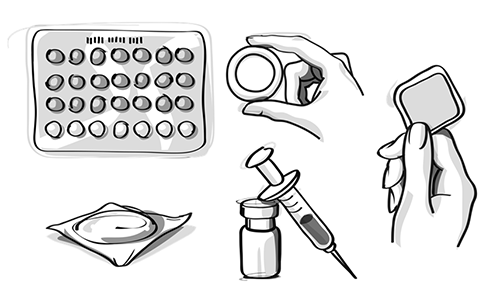Contraception Doesn't Equal Less Pleasure
Sex is a topic less spoken about in our society. People still possess awkwardness, discomfort and uneasiness while sex is being talked about. People though now are willing to change and are trying to have an open and healthy conversation about the same.
While dealing with such conversations, one comes across different views, ideas and feelings attached to sex. One such view that people come across is the idea of contraceptives, people have varied thoughts,myths and feelings about them. One such belief is that contraception is tantamount to less pleasure.Which is absolutely absurd.

What is contraception?
It’s firstly important to know what contraception is?
So, the deliberate use of artificial methods or other techniques to prevent pregnancy and STIs, is called contraception. There are many different types of contraception, but not all types are appropriate for all situations. The most appropriate method of birth control depends on an individual’s overall health, age, frequency of sexual activity, number of sexual partners, desire to have children in the future, and family history of certain diseases.
Types of contraception
Following are the types of contraceptives one can use-
- LONG ACTING REVERSIBLE CONTRACEPTION (LARC)
Methods of birth control that provide effective contraception for an extended period without requiring frequent usage. These include Contraceptive-injections, intrauterine devices(IUDs), and subdermal contraceptive implants.
These are the most effective reversible methods of contraception because their efficacy is not reliant on patient compliance.
- HORMONAL METHODS
Hormonal methods of birth control use hormones to regulate or stop ovulation and prevent pregnancy. Ovulation is the biological process in which the ovary releases an egg, making it available for fertilization. Hormones can be introduced into the body through various methods.
It is of two types, one is short acting hormonal methods and other being combined hormonal methods.
(i) Short acting hormonal methods– It includes the usage of pills, injections, skin patches, vaginal rings, intrauterine systems, and implantable rods.These are highly effective if used perfectly, but in typical use, they have a range of failure rates.
(ii) Combined Hormonal methods– Combined hormonal methods contain a synthetic estrogen (ethinyl estradiol). The combined estrogen/progestin drugs can be delivered by pills, a patch, or a vaginal ring. The combined hormonal methods have some medical risks, such as blood clots, that are associated with the synthetic estrogen in the product. These risks have not been observed with progestin-only hormonal methods such as injectable birth control, POPs, or hormonal LARCs. Your health care provider can discuss your risk factors and help you select the most appropriate contraceptive method for you.
- BARRIER METHOD
Designed to prevent sperm from entering the uterus, barrier methods are removable and may be an option for vagina owners who cannot use hormonal methods of contraception. It is the most commonly used method of contraception.
It includes the usage of external condoms, internal condoms, contraceptive sponges and spermicides. Diaphragms and cervical caps can also be used but it requires a visit to a health-care provider.
- EMERGENCY CONTRACEPTION
Emergency contraception can be used after unprotected intercourse or if a condom breaks. It includes the usage of copper IUD and emergency contraceptive pills (EPCs).
- STERILIZATION
Sterilization is a permanent form of birth control that either prevents a vagina owner from getting pregnant or prevents a man from releasing sperm. A health care provider must perform the sterilization procedure, which usually involves surgery.This process is not reversible. This includes sterilization implant, tubal ligation and vasectomy.
Mentioned above are the various ways of contraception, the major reason why contraception was brought to life was to avoid unwanted pregnancy and to practice safe sex.

Why some people belief in the myth "Contraception equals less pleasure"
There are various reasons which individual suggest on why they consider sex with contraception less pleasurable. It includes-
- Low libido– Low Libido is a persistent or recurrent lack of interest in sex. This is known in medical terms as hypoactive sexual desire disorder. However, this problem is often not as serious as it sounds, and it is important for suffers of any sexual problem to feel comfortable about seeking help.
- Contraceptives engenders a casual attitude toward sexual relations– The mutual commitment of a couple implied by the very nature of this intimate self-giving is now overshadowed by the fact that the most obvious (though not necessarily the most important) reason for that commitment has been eliminated. This clearly contributes to the rise of casual sex, and the rise of casual sex has enormous implications for psychological and emotional well-being, personal and public health, and social cohesion.
- Contraceptives shifts the emphasis in sexual relations from fruitfulness to pleasure– Naturally-speaking, the sexual act finds its full meaning in both emotional intimacy and the promise of offspring. Till date for a majority of people, sex is clearly oriented toward love and the creation of new life. And hence, they believe by eliminating the possibility of new life and the permanent bonding it demands, contraception reduces the meaning of human sexuality to pleasure and, at best, a truncated or wounded sort of commitment. Which is absurd as sex caters so many other needs and desires than just to produce a new life!

What do the facts suggest?
Studies suggest that fewer than 5% of people on birth control experience a decrease in sex drive, meaning that most women using contraception don’t notice a difference. Some women even notice an improvement in their sex drive while using birth control. This could be because they’re less worried about becoming pregnant or getting an STI.
Women rank pregnancy prevention as the single most important contraceptive characteristic when choosing a method, with 90% citing it as “very important.” The health risks associated with particular methods and protection from sexually transmitted diseases (STDs) are rated as the second most important characteristics by women (each mentioned as “very important” by 77%). In contrast, men consider STD prevention for themselves and their partner to be just as important as pregnancy protection (each mentioned as “very important” by 84-86%), and they rank STD prevention as more important than other health risks (by 72%).

Conclusion
In a nutshell, there are a lot of beliefs that individuals hold regarding contraception and sex in general. Though the topic is now being considered a part of healthy conversation, the perceptions that individuals possess need to change. One such perception is contraception. There are various methods and techniques one can use to practice safe sex keeping in mind their condition, need and wants. It is important that one knows about it. Myth regarding contraception is equal to less pleasure needs to shatter. Individuals should know that contraception is for their own good and has barely anything to do with the reasons they state. It important to indulge in healthy and safe sex.
Cover Illustration: Greatist
Author

